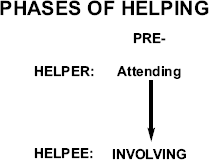One of the ways to measure our listening skills is to test our verbatim recall of the helpees’ expressions. Simply listen to these expressions and try to repeat verbatim what you heard. We may practice in live interactions or with written or taped expressions. We may rate the accuracy of our recall as follows:
| High accuracy |
— Verbatim recall of expression |
| Moderate accuracy |
— Recall of gist of expression |
| Low accuracy |
— Little or no recall of expression |
In the end, the entire verbal helping process hangs on our ability to listen and to process the content and affect of the helpees’ expressions.
LEVELS OF LISTENING
Now we can begin to build our own cumulative rating scale for helping. If the helper is attending personally, observing and listening to the helpees, we may rate the helper as fully attentive (level 2.0). If the helper is only attending personally (squaring, leaning, eye contact), then the helper is rated at a less than fully attentive level (level 1.5). If the helper is not attending personally, then the helper cannot be rated in relation to the helpee (level 1.0).
LEVELS OF HELPING
5.0
4.5
4.0
3.5
3.0
2.5
2.0 Observing and listening
1.5 Attending personally
1.0 Nonattending
LEVELS OF HELPING—ATTENDING
If we have attended to the helpees effectively, then we will have involved them in helping. The helpees will experience comfort in the preparations we made for them. They will experience security in our attentiveness. They will begin to share their experiences, and we will have the opportunity to listen and hear their expressions.
Above all else, the helpees will begin to reciprocate by involving themselves in the helping process. They will prepare for their sessions. They will become attentive and observant of themselves and others. They will begin to share their experiences and listen in turn to the expressions of others. In so doing, the helpees signal their readiness to enter the exploratory phase of helping.

FACILITATING INVOLVING
Like any other set of skills, you will want to practice the attending skills until you have integrated them into your helping personality as the helper in the following case study has done.
Case Study #1—Skilled Attending
Terry is a twenty-three-year-old male who is tall, broadshouldered and muscular. Paula, a therapist, first met Terry in the waiting room outside her office. Her only preparation was a phone call, received from a company where she had a contract to provide employee assistance counseling, asking her for an emergency appointment for Terry that afternoon.
When Paula walked into the waiting room, she was surprised. Terry did not look like her typical client. He wore work clothes, clean but obviously used for their purpose. Moreover, he was agitated and angry, pacing back and forth, his face contorted with the effort of controlling his rage. After hesitating a fraction of a second, she approached him.
On he talked for another fifteen minutes, nonstop. Once he jumped up and started pacing, slamming his fist into his hand again and again as he talked. Paula stayed in her chair, turning to face him as he walked back and forth. When he realized what he was doing, he smiled sheepishly and sat back down. Finally he stopped his tirade and, sitting back in the chair, looked at Paula sitting across from him.
| Terry: | “You know, you got real guts. Most women would have hightailed it out of here or tried to get me to sit still. Why not you?” |
| Paula: | (quietly, looking at Terry) “You don’t need another person to be afraid of you, nor do you need a mother to criticize you right now. You said you want someone to help you. I’ve got to find out who you are first if I’m going to be that person. I can’t do that if I’m running from you or trying to get you to do what I want.” |
| Terry: | (looking baffled for a minute, then smiling) “You really know what you’re doing. You’ll do.” |
| Paula: | (smiling back) “You’re too strong to allow me to treat you like a child. You’re too strong to allow yourself to act like a child.” |
| Terry: | “You know you’re right. I don’t want to be out of control. All it does is get me into trouble.” |
It took every one of Paula’s attending skills to maintain contact with Terry. She had to attend contextually by preparing herself, the environment and Terry for the interaction. She did that by keeping her tension in control, putting Terry at ease, and by making her office as comfortable and yet as constructive as she could for her interaction with Terry. She made sure she kept good eye contact. She leaned forward and kept herself squared to Terry, even when he was pacing back and forth. She made observations that helped her to recognize that Terry was in control of his anger, but only barely. And she listened to what he was saying, trying to get information for future use.
Her efforts paid off. Her consistent use of attending skills resulted in having Terry commit himself to working with her, recognizing that she could help him grow.
Attending is a necessary but not sufficient condition of helping. It prepares us to relate to others. Indeed, by the principle of reciprocal affect, it initiates the relating process. The people we are working with will tend to relate to us the way we relate to them. If they do not, we will explore why!
ATTENDING ![]() PREPARING FOR RELATING
PREPARING FOR RELATING
